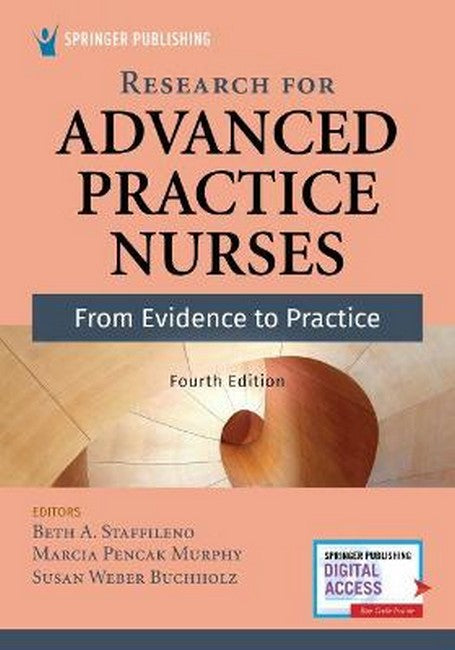Description
I. EVIDENCE-BASED PRACTICE 1. Overview of Evidence-Based Practice 2. Searching for Evidence 3. Research and the Mandate for Evidence-Based Practice Quality, and Patient Safety 4. Continuous Quality Improvement 5. Establishing and Sustaining an Evidence-Based Practice Environment II. BUILDING BLOCKS FOR EVIDENCE 6. Critical Appraisal of Evidence 7. Identifying a Focus of Practice Inquiry 8. Conceptual and Theoretical Frameworks 9. Quantitative Designs for Practice Scholarship 10. Qualitative Approaches for Practice Scholarship 11. Sampling Methods 12. Designing Questionnaires and Data Collection Forms 13. Physiological and Psychological Data Collection Methods III. USING AVAILABLE EVIDENCE 14. Literature Reviews 15. Program Planning and Evaluation 16. Implementing Evidence-Based Practice IV. EVALUATING THE IMPACT OF EVIDENCE-BASED PRACTICE, ETHICAL ASPECTS OF A STUDY, AND COMMUNICATING RESULTS 17. Cost as a Dimension of Evidence-Based Practice 18. Evaluation of Outcomes 19. Ethical Aspects of Practice Scholarship 20. Communicating Practice Scholarship Through Oral Presentation 21. Reporting Results Through Publications 22. Exemplars of APRN-led Initiatives
Beth A. Staffileno, PhD, FAHA, is a professor, Adult Health and Gerontological Nursing and co-director of the Center for Clinical Research & Scholarship at Rush University Medical Center College of Nursing. Dr. Staffileno has consulted with organizations seeking to develop research and evidence-based practice (EBP) infrastructures, has mentored practicing nurses and advanced practice registered nurses (APRNs) with implementing research and EBP initiatives, and has facilitated scholarly dissemination. She has developed an online continuing education course available to staff nurses, EBP and Research for Direct Care Providers. She has also taught Research for Evidence-Based Practice to DNP students and Leadership in the Evolving Healthcare Environment to DNP and PhD students. Dr. Staffileno has published several papers related to implementing EBP initiatives, and is an active researcher with a health promotion/disease prevention focus. Much of Dr. Staffileno's research has involved lifestyle change interventions for cardiovascular risk reduction in women and vulnerable populations. Currently, she is working with an interprofessional team using augmented intelligence technology to tailor health information efficiently and effectively for high-risk groups in order to promote healthy lifestyle behaviors. Dr. Staffileno is a Fellow of the American Heart Association and Institute of Medicine of Chicago. Marcia Pencak Murphy, DNP, ANP, FAHA, FPCNA, is a professor emeritus at Rush University College of Nursing. She served as program director of the Adult-Gerontology Primary Care Nurse Practitioner program for 15 years. She has extensive experience supervising master's capstone projects and doctor of nursing practice (DNP) projects in the area of adult-gerontology. Dr. Murphy has over 30 years of experience as an advanced practice registered nurse (APRN) in both acute care and community settings. She has published and presented several papers on the topic of clinical scholarship for APRNs. Dr. Murphy has received several distinguished awards including Fellow of the American Heart Association, Fellow of the Preventive Cardiovascular Nurses Association, and Fellow of the Institute of Medicine of Chicago, and is active in several organizations including the Preventive Cardiovascular Nurses Association, the American Heart Association, and the Institute of Medicine of Chicago. Susan W. Buchholz, PhD, RN, FAANP, FAAN, is a professor, Adult Health and Gerontological Nursing at Rush University Medical Center College of Nursing. Dr. Buchholz is funded by the NIH National Institute of Nursing Research. The long-term goal of her research program is to develop cost-effective strategies to increase physical activity among low physically active adults. Within her research, she uses innovative mHealth strategies to promote physical activity. Globally, she is one of the first researchers to use a Sequential Multiple Assignment Randomized Trial design to explore how to optimize adaptive interventions to improve physical activity. She has conducted and published on her quantitative and qualitative research, including integrative and systematic reviews. As an Adult Nurse Practitioner faculty member, she is committed to high-quality nurse practitioner education and is currently serving as President-Elect on the National Organization of Nurse Practitioner Faculties Board. She is a Fellow in the American Academy of Nursing. She is also a Fellow in the American Association of Nurse Practitioners and served as the Chair of the inaugural American Association of Nurse Practitioners Nursing Research Committee.

